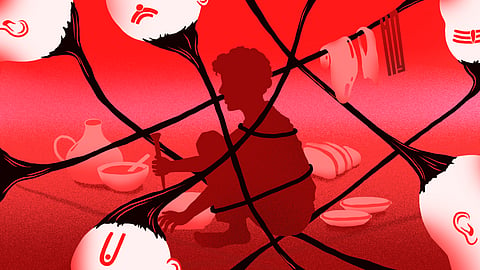
- HOMEGROWN WORLD
- #HGCREATORS
- #HGEXPLORE
- #HGVOICES
- #HGSHOP
- CAREERS
- ABOUT US
- CONTACT US

Casteism is one of the top most issues that are swept under the rug across country. We like to believe that it doesn't exist anymore. Even with daily incidents surrounding caste, we fail to see it as a real threat to an equal society. But the privilege of ignoring this discrimination only lies with those who it doesn't affect; the upper castes. Unless of course, there's a debate on reservation. Then we step in. Obviously.
Caste may not dictate occupation and imposed marriage restrictions in modern society like it used to, but it very much still exists. And our ignorance of its prevalence might just be one of the things keeping it alive and even thriving.
Today, the hierarchical nature of the caste system has seeped into our perceptions, fueling a sense of superiority among higher castes and classes and marginalizing those from lower ones. This conditioning is insidious and starts from an early age, as children are raised in an environment where caste-based biases are often subtly, yet powerfully, reinforced through social interactions, cultural norms, and even religious practices.
Since caste was the factor that determined people's jobs and duties, it established a hierarchy in occupation that still affects how we view others based on what they do. Occupations such as manual scavenging and sewage cleaning are disproportionately assigned to those from lower castes, reinforcing their marginalized status. The physical and psychological toll of such labor is immense, as individuals are condemned to endure the harshest and most hazardous working conditions, further entrenching their social disadvantage.
The same stigma infiltrates other manual jobs like domestic work, auto repair and sanitation. Just pay attention to your surroundings, including your own home and how we treat our help. There are 21st century, modern homes in the most metropolitan cities in India where there's a separate entry for the house help, gardeners, and maintenance workers.
Sometimes they have separate glass and utensils to eat and drink out of, a different and even an assigned bathroom to use. Other times we call them our family and offer them gifts during festivals as a way to overcompensate for the lack of fair wages, opportunities, and the 'othering' they fall victim to that we know we have all participated in at some point in our lives.
Education is often heralded as a means to eradicate caste-based discrimination. Lower caste communities look to education with hope to move out of these 'backward' spaces that perpetrate bigotry only for them to find out it's everywhere; even in supposedly enlightened spaces. Lower caste individuals, despite obtaining an education, frequently face discrimination when seeking employment or trying to advance in their careers. The deep-seated biases of employers and colleagues hinder their progress, relegating them to lower positions or denying them opportunities commensurate with their qualifications. Dr Payal Tadvi's suicide, along with numerous other cases of Dalit doctors choosing to end their lives, will speak to that.
Casteism's impact goes beyond everyday prejudices and biases. Caste-based violence continues to plague Indian society, often resulting in grave consequences for marginalized communities. Incidents of physical assault, social boycotts, and even killings based on caste identity are regrettably common. With over 50,000 cases, caste-based crime only keeps rising every year. If their lives aren't attacked, their dignity and humanity is. And when these cases do come forward, perpetrators insist the agressions weren't caste-based. What motivation, other than asserting one's own superiority over another life would make a grown man urinate over another man's face? It might sound like some barbaric gesture of dominance, but it happened just yesterday in Sidhi.
Where does all this anger brewed from centuries of injustice go? Even when it's poured into stories, music and art, it's still invalidated and adulterated through the lens of the upper class. From Bollywood's Savarna-favouring tropes and zero real representation to traditional Indian art forms like classical dances and Carnatic music defined by Brahmin ideologies to modern rap songs boasting 'untouchable' Brahmin supremacy, Dalit & lower caste voices are buried under the loud, self-important and ignorant narratives of the upper castes and writhe under token activism.
Zomato's latest casteist ad for World Environment Day and their non-apology is a testament to how tone-deaf most of India is when it comes to the acknowledgement and consideration of caste. Even the wokest of us who run, torch-bearing, to the defence of Black communities in America against police brutality are essentially blind to the bigotry happening here at home.
The violence, deaths, oppression and humiliation are all overshadowed by the complacent Savarna social narratives. Furthermore the delusional separation of caste from class has us convinced that the problem isn't that severe and perhaps doesn't even exist. And how can you fight something you don't see?
